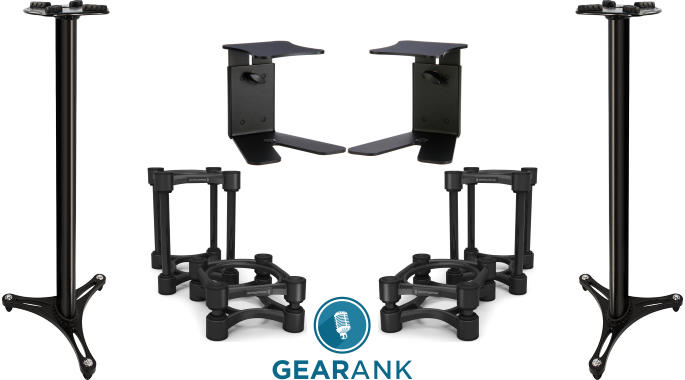
Disclosure
We recommend all products independently of 3rd parties including advertisers. We earn advertising fees from:
• • • • •

• • • • •
Amazon
As an Amazon Associate we earn from qualifying purchases.
• • • • •
One of the main reasons for using studio monitors isn’t the frequency response, but the stereo image. Headphones are fine for mixing but placing musical elements in a space is better perceived with a proper studio monitor setup.
To make the most of your speakers and achieve a good stereo field with a solid phantom center and wide sweet spot, proper placement must be observed. Unlike regular speakers, studio monitors must be angled towards the listening position. This also means that the tweeters must be elevated to ear height for the widest sweet spot.
In order to achieve these, it’s important to prop up your studio monitors on stands. Aside from proper placement, stands decouple the speakers from objects that might resonate along with them, altering their frequency response. It also keeps table or console reflections to a manageable level.
These factors combined allow you to not only mix better, but faster as well.
The Best Studio Monitor Stands – 2024
| Gearank* | SRC* | Check Price | ||||||
|---|---|---|---|---|---|---|---|---|
| Floor Stands | ||||||||
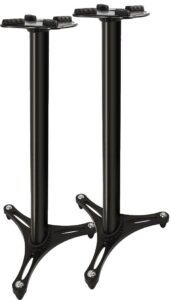 | Ultimate Support MS-90/36B (Pair) | 96 | 225+ | |||||
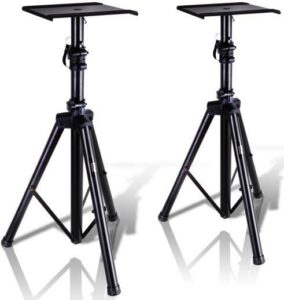 | Pyle PSTND32 (Pair) | 96 | 2300+ | |||||
| Desktop Stands | ||||||||
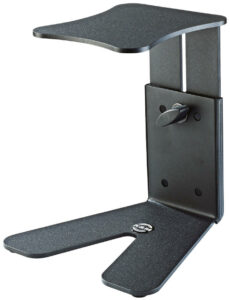 | K&M 26772 (Single) | 95 | 375+ | |||||
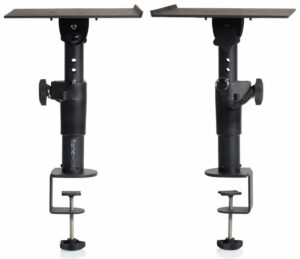 | Gator Frameworks Clamp-On (Pair) | 95 | 1150+ | |||||
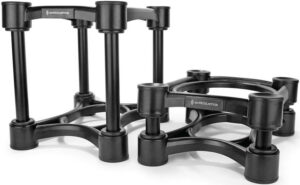 | IsoAcoustics ISO-200 (Pair) | 95 | 275+ | |||||
| Additional Option for Subwoofers | ||||||||
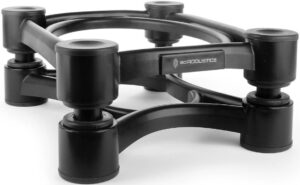 | IsoAcoustics ISO-200Sub (Single) | 92 | 750+ | |||||
Author & Contributors
Raphael Pulgar
I've been an audio engineer for 20 years specializing in rock and metal recordings. I also play guitar and produce original music for my band and other content creators.
Studio Monitor Stands - Floor
Below are the best in floor stands with two different bases. Depending on your studio space or speaker size, one will be more favorable to use than the other.
Ultimate Support MS-90/36B 36" Floor Monitor Stand (Pair)
Cons
- Non-adjustable rubber pads
- Limited leveling adjustments
Pros
- Good sound-decoupling pads
- Cleaner high-end because of decoupling
- Stable structure and good overall quality
- Internal cabling allows for clean setups
The Ultimate Support MS-90/36B is especially designed to meet the space and isolation demands of studios. This particular model is 36" tall, and comes with four sound-decoupling pads that work well with many of the most in demand near field speakers.
It is crafted from aluminum with three internal channels, two of which are meant for neatly organizing audio and power cables, while the third one is meant to be filled with shot or sand for added stability. The overall quality of the construction is good, and the structure is stable. And it also helps that it looks nice and is great for achieving a clean home studio look. Note that leveling the speaker is a bit of hassle because the rubber pads are not adjustable.
This is a good stand for popular 8" studio monitors from Rokit, Yamaha, ADAM and more.
If you need a medium height stand with good cable management options for your studio, the Ultimate Support MS-90/36B is a solid, aesthetically pleasing choice.
Specifications
- Height: 36"
- Material: Aluminum
- Top Plate Size (D x W): 10.25" x 12"
- Base Size (D x W): 19" x 19"
- Weight Capacity: 75 lbs.
- Weight: 12.2 lbs.
| Website | Source | *Rating Value |
| YouTube | Soundcast Studios | 96/100 |
Pyle PSTND32 Studio Monitor Speaker Stand (Pair)
Cons
- Limited speaker platform space
Pros
- Versatile, high load capacity speaker stand
- Can double as PA speaker stand
- Adjustable and foldable design
- Easy to use and setup
The Pyle PSTND32 is a versatile and portable speaker stand that works just as well in the studio and on-stage, thanks to its adjustable height and foldable design.
For the price, the construction is pretty decent, and setting up is quite easy. It does the job really well, without any complexities.
It even features rubber grip speaker pads that prevent slippage and distributes the weight of the speaker evenly resulting in stable positioning. The pads also work together with the rubber cap feet used on the stand's foldable tripod base to reduce unwanted vibrations or resonance.
It works much like a PA speaker stand, with height adjustments for positioning. So you can use it as an outdoor PA stand if needed, which adds to its functionality and value.
Given its impressive load capacity of up to 90 lbs, it would've been nice if it hand a wider speaker platform to handle bigger speakers.
The PSTND32 from Pyle Audio is an affordable studio monitor stand that can double as a reliable PA speaker stand, definitely worth checking out.
Specifications
- Height: Adjustable (34" to 53")
- Material: Steel
- Base Size (L x W): 8.9" x 8.9"
- Weight Capacity: 90 lbs.
- Weight: 6.1 lbs.
Studio Monitor Stands - Desktop
Below are three different desktop stands that range from a simple but solid platform stand to an advanced vibration decoupler desktop stand. Get to know each to pick the one that fits your purpose and budget.
K&M 26772 Tabletop Stand (Single)
Cons
- Limited positioning
Pros
- Simple design with height adjustment
- Tank tough and stable
- Easy to install
Not everyone has the floor space to put up stands for their studio monitors. For those of us with limited real estate and a tight budget, the K&M 26772 is a tabletop stand meant to elevate your monitors and provide a measure of isolation.
What makes it special is its sturdy build, it's weighty and inspires confidence. It's stable and gets your speaker elevated without any problem. The K&M 26772 has a simple design with height adjustment. This limits what you can do in terms of positioning, but also makes it very straightforward to use. The design also allows for some extra space under the speakers.
If you're looking for an affordable tabletop stand that feels sturdy, looks good and is easily adjustable, look no further than the K&M 26772. With a stellar track record, it is a great pick if you need a good tabletop stand.
Specifications
- Height: 6.5"-10"
- Material: Steel
- Platform Size (L x W): 6.6" x 5.9"
- Base Size (L x W): 8.2" x 8.4"
- Weight Capacity: 33 lbs.
- Weight: 6.83 lbs.
Gator Frameworks GFWSPKSTMNDSKCMP Clamp-On
Cons
- Tilt angle is quite shallow
Pros
- Good build quality
- Solid and stable clamp assembly
- Lifts up your speakers to free up desk space
This Clamp-On model is an alternative solution to straightforward desktop stands.
Instead of taking up space on the surface of your desk, a secure clamping mechanism attaches the platform assembly to the edge of your desk, freeing up space for other items or peripherals. The freed space results in a cleaner setup, and allows you to better align the speakers to your ears.
Build quality is good, and the clamp assembly feels solid, which makes this an easy and worry free addition to any desktop studio setup.
Tilt angle is quite shallow, and this limits the ability to angle the monitors towards your ears especially when you prefer monitors pointing down from above.
If desk real estate is low or you want more space on your desk for other peripherals, the Gator Frameworks Clamp-On monitor stand is your best bet.
Specifications
- Height: 10.12"-13.5"
- Material: Steel with Black Powder Coat
- Platform Size (L x W): 12" x 9"
- Weight Capacity: 60 lbs. each
- Weight: 5 lbs.
| Website | Source | *Rating Value |
| YouTube | James Gavin | 93/100 |
IsoAcoustics ISO-200 Desktop Isolation Stands for Studio Monitors (Pair)
Cons
- Needs space on your desk vs floor stands or clamps
Pros
- Varied adjustability for angles and height
- Decoupling keeps table from resonating for clearer sound
- Easy setup
The IsoAcoustics ISO-200 is more than just a tool to prop up your speakers. It's also a decoupler and keeps the enclosure's vibrations from going to your table and preventing it from resonating. This has an effect of reducing excess resonant bass from what you hear and helps make you perceive the actual low end better. This clarity makes your mixes translate better across different playback systems.
Despite being made of plastic, it still feels stable and you're not missing out from much compared to its aluminum sibling, the Aperta 200 - which also comes at a higher premium.
Another advantage of the ISO-200 over the higher priced Aperta 200 is that the latter has no height adjustment. This may be important for taller users that need the tweeters elevated to ear level.
The only thing I'd say is a con is that it takes up space on your desk. If your desk is smaller or has no platforms for speakers, desktop real estate may end up being a bit congested.
It works subtly but it's a large difference when you're made more aware of the limitations of your speakers. And if you can't yet tell the difference, getting it conditions your ears to better stereo separation and bass clarity.
Specifications
- Height: 3.5"
- Material:ABS Plastic
- Base Size (D x W): 7.8" x 10"
- Weight Capacity: 60lbs
Additional Option for Subwoofers
While you can place a subwoofer on a regular stand, this one is engineered specifically for decoupling and isolation.
IsoAcoustics ISO-200Sub (Single)
Cons
- Does not work properly with downfiring speakers
- A bit small for those who use big subs
Pros
- Multiple placement options
- Decouples your subwoofer from the surface
- Noticeable improvement in bass clarity and cohesion
One of the hardest things to have under control are sub frequencies. They are omnidirectional, highly affected by parallel walls (standing waves) and resonate like crazy with a lot of different objects.
To take away at least one of these factors would be a great incremental improvement. This is why the IsoAcoustics ISO-200Sub is on our list: Aside from having your monitors propped up to position and decoupling them from surfaces, subwoofers are usually an afterthought.
The ISO-200Sub shares the same engineering and philosophy as other IsoAcoustics gear in this guide with the exception of being specifically tailored for decoupling subwoofers from the floor and provide more placement options for optimal sound and synergy with your main speakers. This results in immediately noticeable improvement in bass clarity and cohesion. This decoupling is particularly important for people who live in apartment buildings, the subs won't rattle the floor or surroundings.
There are some downsides though, like it being too small for big subwoofer types. It also won't work properly with down-firing subwoofers.
If you're a basshead that wants low frequency clarity from the sub itself and not your floor, walls or anything near the unit, the IsoAcoustics ISO-200Sub is an essential pick.
Specifications
- Height: 5" Maximum
- Material: Aluminum
- Base Size (L x W): 10" x 7.8"
- Weight Capacity: 75 lbs.
Things to Consider When Buying Studio Monitor Stands
- As the name implies, floor stands are meant to be used on the floor, usually in the form of a metal pole that elevates the speakers to a desired height. They are the most common type used on Public Address systems because they can secure and position bigger speakers, but the same principle also applies to studios. Floor stands are ideal because they lift the speakers far from vibrating and reflective materials - like the floor or your desk. But they do usually take a lot of space, and are not ideal for smaller studio monitor speakers (you don't want small speakers too far from the listener).
Desktop stands are meant for positioning and isolating smaller monitor speakers on a desk or tabletop. They are usually compact and serve as bottom base for the speakers. As such they don't have the positioning capabilities of a floor mount stand, and are usually limited to smaller speakers. More importantly, they isolate your speaker from your desk, which translates to a clearer sound.
Note that we left out other types of speaker stands and wall mounts for PA speakers and Stage Monitors, in order to keep this guide focused on the types primarily used in home studios.
- Isolating or decoupling your speaker prevents unwanted vibration transfer to your desk or floor, resulting in less unwanted noise or frequency issues. This is usually achieved by rubber materials that absorb cabinet vibration, and these are usually placed on the speaker base and on the point where the stand meets the floor or desk.
Desktop speakers benefit the most from isolation because they are standing in close proximity to a solid object that reflects audio and transfers vibrations. This is the reason why many desktop stand users report improvements to their sound. This is important when choosing between Studio Monitors vs Speakers since consumer speakers. Consumer speakers do not need isolation as much as a studio monitor does.
The stands featured above all have some sort of isolation mechanics built into them, but you can add in some more DIY style if needed.
- When considering studio speaker stands, you may want to carefully plan how you're going to lay out your cables to match your planned setup. Some speaker stands that have built-in cable management features. You may also want to extend your budget so you can get back up cables while you're at it.
- Modern studio speakers generally have wider sweetspots, so getting the speaker in appropriate position is no longer as hard as before. But to make the most of your speakers, you'll want them positioned in the right height and angle that matches your listening position best. This is where height and tilt adjustments come in handy. In general you'd want the tweeters at ear level and the distance between them the same as the distance to your ears, effectively forming an equilateral triangle with your listening position.
Floor and Desktop Stands
Isolation
Cabling
Positioning
Studio Monitor Stand Selection Methodology
The first edition was published in 2018.
We started by looking at speaker stands for studio monitor use, and decided to focus on floor and desktop stands which are the most common choice for home studios. We then short-listed 40 popular and highly rated stands that were readily available from US based music gear retailers - you can see the list in the Music Gear Database. We ended up gathering over 16,300 reviews, ratings and recommendations from experts and users, all of which were then processed using the Gearank Algorithm. This process gave us the rating scores out of 100 that we used to select the highest rated stands to recommend. Our recommendations are presented in two main categories: Floor and Desktop, as well as an extra section for subwoofers. For more information about our methods see How Gearank Works.
About the Author and Contributors
Here are the key people and sources involved in this guide's production - click on linked names for information about their music industry backgrounds.
Lead Author & Researcher
Raphael Pulgar
I've been an audio engineer for 20 years specializing in rock and metal recordings. I also play guitar and produce original music for my band and other content creators.
Some of the recording gear I use in my studio includes the Focusrite Scarlett 18i20, Focusrite Scarlett Solo, Samson QH4 Headphone Amp and Cloudlifter CL-1. My mics include Aston Origin, Aston Element, Shure SM57, Rode NT1, Rode PodMic and MXL V67G.
Contributors
Jason Horton: Editing and Illustrating.
Media
Main/Top Image: By Gearank.com using photographs of the Ultimate Support MS-90/36B, K&M 26772 and IsoAcoustics ISO-155.
The individual product images were sourced from websites, promotional materials or supporting documentation provided by their respective manufacturers.

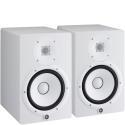
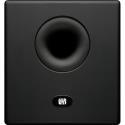
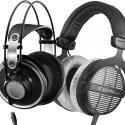
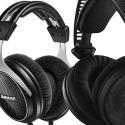

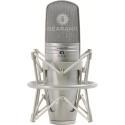
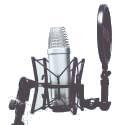
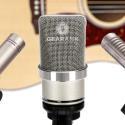
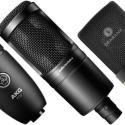
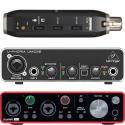
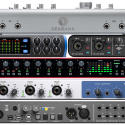
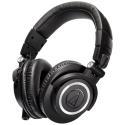
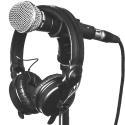
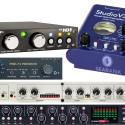
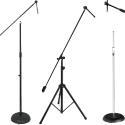
The following stands came off the recommended list when we published the December 2022 Edition:
Publication of our January 2022 Edition resulted in the following stands coming off the recommended list above, but you can still see our analysis of them:
Our March 2021 update resulted in the following stands coming off the recommended list above, but you can still see our analysis of them:
As a result of our April 2020 update the following came off our recommended list above, but you can still read our analysis of it: